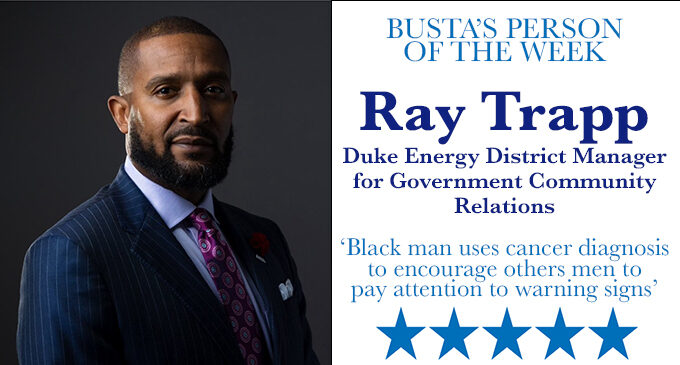Busta’s Person of the Week: Black man uses cancer diagnosis to encourage other men to pay attention to warning signs

By Busta Brown
Ray Trapp has gone through one heck of a storm. It’s his reaction to that adversity that has made him triumphant. “This journey has made me even more faithful to God,” shared Ray. If you don’t mind, I’m going to paraphrase a few quotes to describe my dear friend: “Integrity is doing what’s right, when no one but you and God will ever know.” Ray lives by that daily. “Humility is not thinking less of yourself, it’s thinking of yourself less.” That’s in his DNA.
Who is Ray Trapp?
“That’s a really good question. But I think when I define myself at the end of the day, I just want to be a good person, you know. I look out for everyone. I love being a connector and collaborator, a consensus builder. I think those things make me who I am. I’m constantly looking to solve problems, because I really want the best for everyone and the best out of everyone. So, however I can help people get there – whether it’s professional, whether it’s personal, whatever it is – I want to help. I’m constantly seeking to get the best out of people and pour the best into people and help them on their journey however I can.”
What role did your parents play in you becoming the man that you are today?
“My parents were the best examples of co-parents. I’m from Greensboro and Atlanta because I spent equal time between both cities. My mom was in Greensboro and my dad was in Atlanta. During the school year I stayed with my mom, and every summer I stayed with my father. And then in sixth grade the schedule just flipped. What I learned from them is that I could do anything. It was never one time in my life when I didn’t think that I could not become anything that I wanted to be. I had the advantage of growing up in Greensboro when Jesse Jackson was running for president. So, here’s someone that I identified with. So even as a six year old, there was nothing that I didn’t feel that I couldn’t do. I also had the advantage of being exposed to Atlanta, which is the Mecca of Black-owned businesses. My dad was also an entrepreneur. The mayor of Atlanta was Black, the city council … so, you know, I saw these things very early on. So, I never thought there was a limit to what I could do.
“I lived with a caring mother that would give me anything and everything. She would go without so that I could have. My father was always in my life. Even though I may not have lived with him, there was never a time that I couldn’t pick up the phone and call him or didn’t talk to him or didn’t see him on holidays or birthdays or anything like that. To have both of my parents pour into me and build me up and not tear me down, I had an extremely privileged childhood. And I don’t take that for granted.
“I was bused from Phillips Avenue, an underserved, poor part of Greensboro, to Urban Park, the most affluent part of town. Every class I was in in elementary school, I was probably the only Black person in my class, but I never felt second. I never felt third. I understood that I had to work twice as hard, show myself to be twice as smart. But I didn’t put a chip on my shoulder, and I never felt inferior. That comes from carrying myself with confidence and keeping my head high, knowing that I’m just as good as anyone else and I can compete with anyone. Just as smart as anyone. I knew I was just as good. So, I was like, OK, let’s roll. What are we doing? Let’s go.”
When did you get the political bug?
“It was a childhood dream, after seeing Jesse Jackson do it. Guilford County Commissioner Chair Skip Austin is my mentor. I could see what they were doing and the differences that they were making. I wanted to be an elected official, but what I found out was that the elected part is the byproduct of everything else. The work is what I really wanted to do, because what moves me is the community. It’s the work, you know, regardless of what my title is, I’m always going to be in the community. To be elected was one of the greatest experiences of my life, because I got more ingrained in the community once I got elected. Coming from an underserved background, I understood robbing Peter to pay Paul. I understood how to operate in a situation when you have $20 but $25 is due to bills. I used to say to all my colleagues, rich people can’t make policies that work for poor people because they don’t understand being poor. If you don’t understand being poor, there’s no way that you can make effective policies for poor people. You don’t understand the mindset.”
What was one of the most difficult situations you had to deal with as a county commissioner?
“When I hear about someone losing benefits for selling food stamps. Sometimes, the reason that that person is doing that is so they don’t have to sell drugs or rob people. When you’re on Section 8, you can only make a certain amount of money or you lose your benefits. Once you start to make a certain amount of money, your Section 8 blows your food stamps. They cut back your food stamps first, so that person’s making a cost benefit analysis to say, ‘I don’t make enough money at this job to pay my rent and to take care of everything else. So, what do I do?’ They sell food stamps. I know it’s illegal, but it still breaks my heart to see it happen, because I understand their dilemma.”
Trapp eventually left the political arena to work at his alma mater, North Carolina Agricultural & Technical State University, as director of external affairs under Dr. Harold Lee Martin Sr. But he continued his commitment to the community. “Working at A&T was my dream job!” said Ray.”
You had your dream job at NC A&T. So, why did you make the transition to Durham?
“During COVID, a headhunter reached out from Research Triangle Park, the biggest research park in the country. They made this father of six an offer he couldn’t refuse. A handsome salary, vehicle allowance, and more. The vice president of strategic engagement for the Research Triangle Foundation, which runs all 7,000 acres of RTP. Great offer and great expansion of what I was already doing. It’s like OK, here’s the next layer. I’m only 50 minutes away from Greensboro, and my youngest children are still there. I’m back and forth with them. I can still make it to games. I can still make it to whatever they have, and they can still be here every weekend. So, it was perfect.”
Trapp stayed there for a little while and eventually transitioned to his current role at Duke Energy, as the district manager for government and community relations over Durham County, Orange County, Chatham County and Lee County. He’s still pouring into the community and working with the government.
“When I moved to Durham, I fully bought into the history of Durham. My wife moved here with me from Durham so that made the transition easy. She’s from Raleigh and serves as Durham County chief of staff. Life with Shannon and her sons has been absolutely amazing.”
The beautiful power couple have been happily married since 2023. Between the two of them, they have six amazing children.
In 2022, while engaged, Ray began experiencing nagging pain in his back. “It wouldn’t go away. And I thought I did it while working out. I was heavily into martial arts with my kids. We went every week. My father-in-law was like, ‘Well, you know, back pain is a symptom of kidney issues,’ and so I’m like OK, a kidney stone or something like that. I’ll pass this on easily and I’m done. No problem.” But what Ray was experiencing wasn’t going to be an easy fix. “I started to have blood in my urine, but being a man, I was still stubborn. I thought it was the stones working their way through.”
Shannon insisted that Ray go see a doctor. He went to the urologist to get an x-ray. After one CT, the doctor ran it back through just to make sure they got everything. “That doesn’t sound right, like I’ve already had a CT and you’re going to give me another CT? I’m like, something may be wrong,” said Ray. The doctor received the results and told Ray they needed to call someone to talk about his results. He didn’t take the news well, “I’m like, I don’t need to call anybody for kidney stones, Doc. I’m good. And she looks at me and says, ‘No, sweetie, you have cancer, and it is late stage.’ So literally it was like a punch to the gut. I was like, come again? She was one of the best doctors I’ve ever had. She was fully invested. She’s like, ‘I’m going to make a referral to Duke Medical for you right now.’ … on a Wednesday. She called me the next morning at 7:30 to say ‘Hey, I’m just checking on you … wanted to make sure you’re OK. I put your referral in.’ Well, I was at Duke the next day seeing a specialist. He was amazing too. He worked up a plan. He said, ‘We can do this one or two ways. I can give you a little surgical line and go in and take your kidney out, or we can do it the other way. I can open you up completely and take out whatever I see that doesn’t look right to me.’ He said, ‘Of course, that requires me to completely cut you open with a longer time to heal.’ I was like, let’s do it.”
This was Ray’s first surgery. “And my first experience was having my kidney removed,” joked Ray.
The doctor removed his left kidney, adrenal gland, nine lymph nodes and a large tumor. “It was huge! It was almost nine centimeters, like one of the largest he had ever seen,” shared Trapp. “But there was some good news. The cancer had not spread from my kidney to my adrenal gland, and they’re connected. He said your immune system kicked in and held it all in place.”
Due to some heart issues, the doctor stopped his immunotherapy for three months. “I went back, and I’ve been on it now for over a year, with no problems. And I take it once a month. With a complete adjustment to my diet – I’m now a pescatarian. I only eat seafood and vegetables. Between that and working out seven days a week, it’s truly a lifesaver.”
What gave you that push to keep your faith and fight?
“It was my family immediately and I remember saying to my wife, ‘Look, I’m not ready to leave y’all. I still got stuff to do.’ My wife said, ‘We’re going to beat this thing.’ If it wasn’t for her, I wouldn’t be alive today. If it wasn’t for her, I would never have gone to the doctor. She was there through that entire journey. Shannon is my rock! When I first got home from the hospital, she made sure I had everything that I needed. There was nothing that I couldn’t ask her to do that she wouldn’t do. And at the time we were engaged, and I think something kicked in and said, man, you better go ahead and make this one official. For somebody to be there for you through literally wiping your butt, you gotta go ahead and marry this beautiful and strong woman. I think that for us, we are 100% partners in everything. It helps that we previously worked together, so we understand work styles and we understand how we work well together.”
Why is your journey important to share with Black men?
“This made me more of a believer, because I’ve seen it be the other way. I was very upfront with my story, and more Black men need to do the same. I had a buddy come to visit me in the hospital and he’s like, ‘Hey, do you mind if I take this picture?’ And I’m like, yeah, go ahead. So, from there, he sent it to a local newspaper in Greensboro. And then I made a Facebook post about it, being very open. I had people call me and tell me that they had cancer and that my story helped them become more open about their journey. If Chadwick Boseman and so many others had disclosed their diagnoses, me and others probably would have paid more attention to the early warning signs. I’m going to be open with this with the hopes that brothers go to the doctor and get checked.
How does a diagnosis such as cancer affect your mental health?
“I don’t think that people talk enough about the mental health effects. Mentally, it is going to hit you and you’re not going to be prepared for it. It is going to take a huge toll! We see the physical effects with chemo, but you don’t see the mental effects. It’s just as rough as the physical. You can keep moving, you know, stay upbeat, stay encouraged. Make sure you exercise. When I was diagnosed with depression, they gave me meds and I didn’t want to start them because I didn’t want to be dependent on the meds. That’s where the exercise came in. Exercise and the diet helped me with my positive attitude and unwavering faith. I’m able to cope with it and continue living. The biggest thing that I wanted everyone to take from it is that do not let this stop you from living. Live your best life as much as you can.”
Today, he does immunotherapy and gets an infusion once a month. His kidney function is great. It’s now higher with one kidney than it was with two, and his blood pressure numbers are perfect.
“Through all of this, my faith is unshakable … completely unshakable.”
My Phenomenal Person of the Week is Raymond Trapp.









